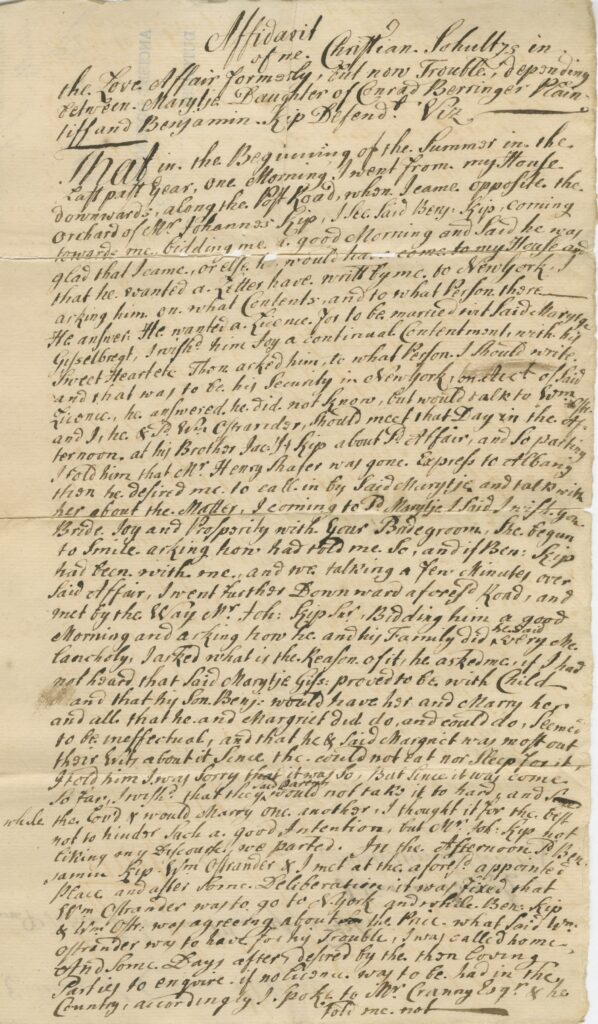POUGHKEEPSIE- For the past decade, the Dutchess County Clerk’s Office and the Department of History have worked to re-house, index, and digitize the oldest legal records in the county, providing free online access to researchers. On Friday, July 21st, a prominent historian of Early America, Dr. Karin Wulf, released a blog post exploring a bastardy case drawn from the online Ancient Documents Search Portal.
Dr. Wulf is currently engaged in a study of how residents of early America defined their family histories. In her post “Love, Actually?,” Wulf explores the complicated romantic relationship between Marytje Berringer Giselbregh and Benjamin Kip of Rhinebeck. The birth of their daughter in October 1760 sparked a bastardy suit which still survives in the Ancient Documents Collection today. During the eighteenth and early nineteenth centuries, town governments were required to pay for the upkeep of children born out of wedlock as part of the larger system of poor relief. The crime of fathering a bastard empowered local officials to seek restitution from the putative father, generating a paper trail that one can still follow today. Wulf’s entry takes the reader through the surviving court records, unfolding the complicated dynamics at play in early American families.
“Scholars have long recognized the importance of this collection for the study of Dutchess County’s history,” said Dutchess County Historian William P. Tatum III. “The case files in this collection preserve otherwise forgotten people and incidents from Dutchess County’s past. These records offer information on impoverished individuals, the enslaved, indigenous peoples, and other residents whose own writings did not survive.”
Dutchess County Clerk Brad Kendall said, “ Sharing the historic resources of the Clerk’s Office promotes a greater understanding of Dutchess County history. We are grateful for the continued funding provided by the New York State Education Department that has helped us preserve and promote this unique collection.”
The Ancient Documents Collection contains the surviving records of the Dutchess County Courts of Common Pleas and General Sessions, dating between 1721 and 1889. The Court of Common Pleas heard civil cases, mostly debt litigation, while the Court of General Sessions was reserved for criminal cases with charges brought by a grand jury. While every county in New York had similar records at one time, Dutchess County’s collection is unusual in both the relative age of the collection and its completeness.
Prior to the beginning of the current digitization project in 2013, the Ancient Documents Collection was partially inventoried by clerks under the direction of former Vassar College President Henry Noble MacCracken in the 1950s.
Professor Wulf’s post on the Giselbregh-Kip case demonstrates how important these Dutchess County collections are for historians and scholars of American History.
Formerly the Director of the Omohundro Institute of Early American History & Culture at the College of William and Mary, Wulf is the Beatrice and Julio Santo Domingo Director and Librarian of the John Carter Brown Library and a Professor of History at Brown University. She has published two books, Delaware, 1638-1776 and Not All Wives: Women of Colonial Philadelphia.
To access Professor Wulf’s blog post, please visit her website at www.karinwulf.com and click
on the “tidbits” link. The Ancient Documents Search portal is accessible for free online.








